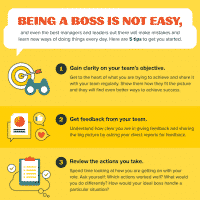Are You Truly a Good Boss?

Whether you’ve worked your way to the top of an established concern, or you’ve found yourself running your own start-up with a skeleton crew of carefully selected employees, chances are you never envisaged yourself as a manager when you started out. Sure, some of us naturally feel the need or instinct to lead, but in most cases it’s a passion for business or an irrepressible urge to realize great ideas that get us started on the career path towards an executive position. This makes the job description of “boss” a unique proposal: with a few exceptions, executives are individuals who think of themselves first and foremost as something other than a boss, and the majority of their skills and instincts will have been developed over years of working, observing, and trial and error. If you ever find time to catch your breath and ask yourself how you got where you are today, and whether you’re truly equipped to fulfill the supervisory aspects of your work, you will quickly come up against the impossibility of properly appraising yourself in a role that is defined by your relationship to others. Let’s take a look at some of the aspects of that role that can benefit from examination and development.
In the first place, a team is a disparate collective of skills and personalities who will be somehow unified towards achieving the goal or goals of the business. In your heart, and on your website, you have a good idea of what those goals are, but communicating them with your staff is another matter. Simply expressing the brand’s stated ethos is not enough to convey the complexity of a team’s goals to the main players; and your own personal goals for the business may be unclearly formulated or difficult to put into words. A good boss should be able explain succinctly yet with passion the team’s objective at a moment’s notice, and explain it within the context of the precise work being done by the specific employee with whom you’re talking. And this isn’t all about stating your goals – it is about having a discussion about how you and your team see the business, and how you can work together to align your targets with the actual work the team does, and how they do it.
So how about that dialogue? If our image of old-fashioned management is to be feared and respected, today’s boss requires the respect of their team more than ever. But fear is out of the question. While there may be healthy distances to be maintained, today’s great leaders understand that for their business to excel requires meaningful collaboration on equal terms. Some of your employees will know more about their area of expertise than you do. Others you’ll have headhunted for their energy and potential, even if they’re still a little wet behind the ears. In either case, you have a lot to learn and to discover from them and alongside them – and this involves a degree of humility. Admitting when you’re wrong or when you don’t know the answer looks stronger, and encourages trust, more than being caught out faking it or pulling rank to save face. Your business is shaped by your team, and your team is shaped by the relationships you nurture, so be ready to ask a lot of questions and listen carefully to the answers. Create the opportunity for feedback sessions where your employees should be made to feel comfortable about letting you know what they appreciate about you and where they could use more support. This can take the form of a brief informal chat at the end of meetings, and monthly one-on-ones in which you can also check that the company vision is still shared by all.
While we’re on the subject of feedback, you’d be right to be nervous of entrusting it purely to your employees. Their opinions may be useful – vital, even – to your own performance and to the development of the team, but of course it can be difficult to get an objective analysis of your skills as a boss, particularly if you’re getting along well with them on a personal level and everything seems rosy. Again, today’s boss is not afraid to discover that there are areas in which they can improve. They actively seek those areas and take practical steps to remedy them – and to develop them as an ongoing principle. This means stepping outside the office and talking to someone who knows more than you. It could be a mentor – a former boss or teacher, even a parent – or it could be in the more formal setting of a business school. Only when you identify the areas that need improving, will you discover the right way to go about it. It could be as ‘soft skill’ as changing your attitude towards a certain employee or aspect of your work; or it could be a matter of taking evening classes to brush up on a certain technical element that is letting your game down.
Now you’re working hard on your own leadership skills and some of the technical know-how you may need to fulfill your position with well-placed confidence. But what happened to that team? Well, if you’re doing a good job, you can forget about them for a while. If you have a solid team of professionals who work well with each other and have a clear, accurate idea of what the business’s objective is, stand back and let them get on with what they’re good at. Show them you trust them by giving them space, and if you’ve developed that meaningful working relationship mentioned above then they’ll come to you when there’s a problem – and they’ll appreciate it when you do find time to drop by and check in. You can expand on this by identifying tasks or areas of work for which you’re currently responsible that may be more effectively looked after by somebody else. As executive, your time is valuable and you have a lot more important things to do than micro-managing the daily workings of your organization, so don’t be afraid to delegate. If it’s your own business, this can be more easily said than done, which is fine – it’s your baby, it’s your vision – but do ask yourself whether you can better facilitate the true potential of your vision by taking personal responsibility for such tasks, or by finding a trusted employee who will know when to consult with you on aspects that you consider important.
You’ve figured by now that being a great boss is less about what you do than how you cultivate a working environment that you can step back from without it falling apart. The final point to remember for now, then, is how to nurture this environment while moving forward. There will never become a moment when you are the perfect boss: all you can be is the best boss for a particular scenario at a particular time. But all of the factors within that scenario are constantly changing, not least of all yourself. Your own skills, ambitions, even your disposition will fluctuate and develop over the months and years, and you must adapt with this as much as with changes of staff or of business climate. Constantly strive for improvement, for self-knowledge, and for innovation – and know when to grip on to these, and when to let them pass. Be sure to communicate these changes, however indirectly, with your team, and watch also for the way that they develop. An employee who’s excelling at one moment may feel under-challenged by the same work within a few months, or undervalued if they are taken for granted. Listen carefully to their needs, whether they’re stating them openly or it is implicit in their behavior and in the work that they do. Ensure that you give them regular feedback on their good work and on problem areas, but always keep it constructive and keep that dialogue open. Your employees will respond to being praised not only as individuals, but as a team: the feeling of collective accomplishment can help the team to bond and to work even better together in the future – and that collective includes you. You job is not to instruct, but to develop that ethic.
If some of these areas cause concern, it is certainly possible to brush up on them in an academic setting or by consulting a professional consultant. But in the meantime you can carry out a quick personal assessment using the flowchart by Headway Capital, which runs through some of the potential problem areas that we’ve discussed, and their solutions. You may or may not be a natural leader, but either way developing these skills and transferring them to a business context should not be considered a simple task, and nor have you failed if you’re not there yet. The greatest bosses recognize that doing it right means ambition, self-awareness, and hard work.
[Infographic by Headway Capital, cover photo: Michael Scott – The Office]
Bring the best of the CEOWORLD magazine's global journalism to audiences in the United States and around the world. - Add CEOWORLD magazine to your Google News feed.
Follow CEOWORLD magazine headlines on: Google News, LinkedIn, Twitter, and Facebook.
Copyright 2025 The CEOWORLD magazine. All rights reserved. This material (and any extract from it) must not be copied, redistributed or placed on any website, without CEOWORLD magazine' prior written consent. For media queries, please contact: info@ceoworld.biz













